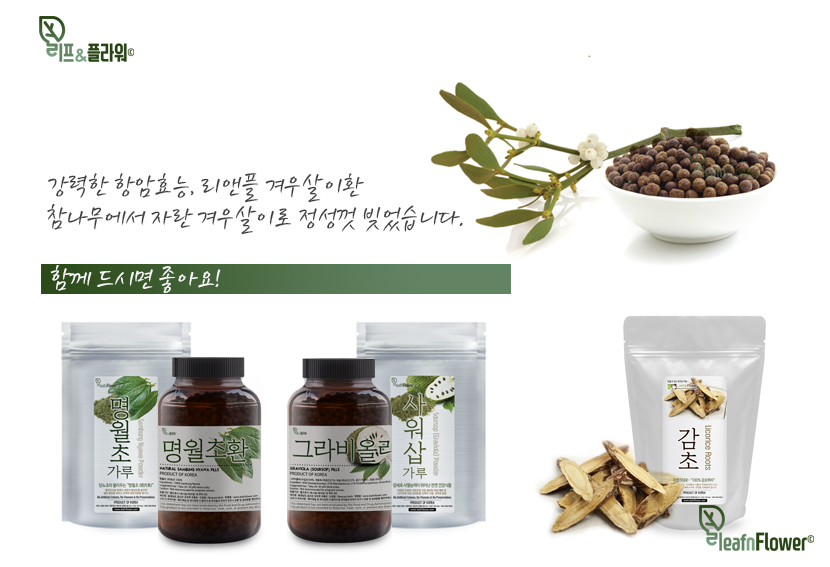Description
Details

Additional
Additional
| Health Benefits | anti-tumor activity, cancer prevention, diabetes, diuretic, high blood pressure, neuralgia |
|---|---|
| Directions | Take 20-30 pills twice a day. |
| Product Package | Glass jar, Pills |
| Good herbal formulation | Jujube, Rhizome of Atractylodes lancea, Longan Fruit |
| Storage Temperature | room temperature |
| Country of origin | Korea |
Reviews
Health
Mistletoe was a sacred plant of the Celtic peoples; the Celts and Gauls called it “all-heal” or “cure-all”.
Shakespeare called mistletoe ‘baleful Mistletoe’, a reference to the Nordic mythology when Baldur, the god of peace and beauty, was slain by an arrow made from mistletoe and then brought back to life by the other Nordic gods.
Mistletoe is used by traditional herbalists as a nervine, antispasmodic, tonic and narcotic and European herbalists considered it to be a specific remedy for St. Vitus’s Dance, epilepsy and other convulsive nervous disorders.
It has a long history as an herbal treatment for delirium, hysteria, neuralgia, and nervous debility and mistletoe tincture was used as a heart tonic in typhoid fever.
Herbal practitioners have used this herb as a treatment for urinary disorders, heart disease, and other symptoms arising from a weakened or disordered state of the nervous system.
Mistletoe has been used to lower blood pressure and heart rate, ease anxiety, and as an herbal sleep aid.
The herb was traditionally used throughout Europe as a remedy for headaches, dizziness, loss of energy and irritability.
It has been used as a traditional herbal remedy for the treatment for cough, especially convulsive cough, bronchial asthma, and asthmatic attacks due to psychological tension.
Traditional herbal medicine uses the herb as a natural treatment for arthritic pain and it is believed to be an effective external treatment for leucorrhoea, gout and sciatica.
Numerous studies have reported that the plant lectins, in viscum album possess toxic, cytotoxic, antitumor, and anticarcinogenic properties.
How To
Suggested Use : Take 20-30 pills twice a day.
Caution : Not recommended for pregnant women.
DISCLAIMER
Some individuals may have adverse reactions to certain plants, herbs, and other natural products.
On any issue where no specific advice is given to consumers please follow this general advice; if you are currently taking the product;
you are advised to discontinue use and consult your pharmacist or herbal medical doctor.
When speaking to your doctor or pharmacist you may find it is helpful to take a copy of this MHRA advice about the product with you.
You should continue to take any medication prescribed by your doctor.
FAQ
Frequently Asked Questions
A: Generally you boil 20g of tea/herb with 2L. of water. The ratio does not matter. However, it is recommended that you control the
saturation of the tea (how strong it is) depending on your personal
preference and body condition.
A: It depends on the tea/herb.
For leaves: boil for 15~20 min.
For hard fruits, roots, and stems: If you soak the tea/herb in water
for 1~2 hours before boiling, you can save time in boiling, and also
get a deeper flavor than without soaking.
A: Currently, what is listed on the site is what we mostly deal with in
retail stores. However, if there is a certain tea/herb that you wish to
get, you can send an email to info@leafnflower.com. or 844-344-0622.
Then, we may offer a price for obtaining the tea/herb, answer questions, and even offer purchase.
A: Yes, you can combine 5~10g of teas/herbs that you already have with Leafnflower.com's teas/herbs.
Although brewing one tea/herb is still good, combining 2~3 teas/herbs helps bring out
the remedial effects of the tea/herbs better than brewing just one tea/herb. However, most tea/herbs contain natural toxins,
and it is recommended that you boil 1~2 pieces of liquorice root along with the tea/herb to remove the toxin.

